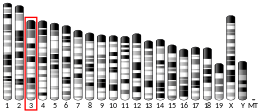SLC27A3
Long-chain fatty acid transport protein 3 is a protein that in humans is encoded by the SLC27A3 gene.[5][6]
In melanocytic cells SLC27A3 gene expression may be regulated by MITF.[7]
See also
- SLC27A3+protein,+human at the US National Library of Medicine Medical Subject Headings (MeSH)
- Solute carrier family
References
- ENSG00000143554 GRCh38: Ensembl release 89: ENSG00000263163, ENSG00000143554 - Ensembl, May 2017
- GRCm38: Ensembl release 89: ENSMUSG00000027932 - Ensembl, May 2017
- "Human PubMed Reference:". National Center for Biotechnology Information, U.S. National Library of Medicine.
- "Mouse PubMed Reference:". National Center for Biotechnology Information, U.S. National Library of Medicine.
- Hirsch D, Stahl A, Lodish HF (Aug 1998). "A family of fatty acid transporters conserved from mycobacterium to man". Proc Natl Acad Sci U S A. 95 (15): 8625–9. doi:10.1073/pnas.95.15.8625. PMC 21126. PMID 9671728.
- "Entrez Gene: SLC27A3 solute carrier family 27 (fatty acid transporter), member 3".
- Hoek KS, Schlegel NC, Eichhoff OM, et al. (2008). "Novel MITF targets identified using a two-step DNA microarray strategy". Pigment Cell Melanoma Res. 21 (6): 665–76. doi:10.1111/j.1755-148X.2008.00505.x. PMID 19067971.
Further reading
- Gregory SG, Barlow KF, McLay KE, et al. (2006). "The DNA sequence and biological annotation of human chromosome 1". Nature. 441 (7091): 315–21. doi:10.1038/nature04727. PMID 16710414.
- Gerhard DS, Wagner L, Feingold EA, et al. (2004). "The Status, Quality, and Expansion of the NIH Full-Length cDNA Project: The Mammalian Gene Collection (MGC)". Genome Res. 14 (10B): 2121–7. doi:10.1101/gr.2596504. PMC 528928. PMID 15489334.
- Pei Z, Fraisl P, Berger J, et al. (2005). "Mouse very long-chain Acyl-CoA synthetase 3/fatty acid transport protein 3 catalyzes fatty acid activation but not fatty acid transport in MA-10 cells". J. Biol. Chem. 279 (52): 54454–62. doi:10.1074/jbc.M410091200. PMID 15469937.
- Ota T, Suzuki Y, Nishikawa T, et al. (2004). "Complete sequencing and characterization of 21,243 full-length human cDNAs". Nat. Genet. 36 (1): 40–5. doi:10.1038/ng1285. PMID 14702039.
- Clark HF, Gurney AL, Abaya E, et al. (2003). "The Secreted Protein Discovery Initiative (SPDI), a Large-Scale Effort to Identify Novel Human Secreted and Transmembrane Proteins: A Bioinformatics Assessment". Genome Res. 13 (10): 2265–70. doi:10.1101/gr.1293003. PMC 403697. PMID 12975309.
- Strausberg RL, Feingold EA, Grouse LH, et al. (2003). "Generation and initial analysis of more than 15,000 full-length human and mouse cDNA sequences". Proc. Natl. Acad. Sci. U.S.A. 99 (26): 16899–903. doi:10.1073/pnas.242603899. PMC 139241. PMID 12477932.
This article incorporates text from the United States National Library of Medicine, which is in the public domain.
This article is issued from Wikipedia. The text is licensed under Creative Commons - Attribution - Sharealike. Additional terms may apply for the media files.




